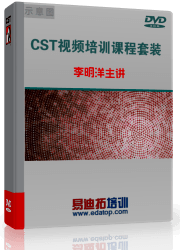- 易迪拓培训,专注于微波、射频、天线设计工程师的培养
CST MWS 2014 - Lumped Element Anomaly between Frequency and Transient Solver
录入:edatop.com 点击:
Hi All
Would somebody be able to help answer the following question:
I use here a simple square loop in MWS layout window to illustrate the problem. With a port placed in a gap in loop and snapped to corners of structure, I see a imaginary impedance of ~ 180 Ohms @ 2.4 GHz. This corresponds well with a first order approximation of the loop inductance calculated by hand. The real part is ~ 0.5 Ohm using PEC (perhaps leave that for latter!). So I now add a second gap in the loop and add a lumped element comprising 0.3 pF to provide a series resonance in the loop. Using the frequency domain solution I see the phase go too ~0 degrees @ 2.4 GHz which is correct. However using the transient simulation it does not!
So now I change the capacitor to a 0 Ohm resistor as this should make the impedance ~ 180 Ohms again using frequency solver which it does, but in transient I get O Ohm.
My suspicion is that there is a grid problem, but I intentionally snapped to corners to avoid this problem.
So my question is does anybody understand this problem between using frequency domain solver and transient ?
Many thanks, Munchie
Would somebody be able to help answer the following question:
I use here a simple square loop in MWS layout window to illustrate the problem. With a port placed in a gap in loop and snapped to corners of structure, I see a imaginary impedance of ~ 180 Ohms @ 2.4 GHz. This corresponds well with a first order approximation of the loop inductance calculated by hand. The real part is ~ 0.5 Ohm using PEC (perhaps leave that for latter!). So I now add a second gap in the loop and add a lumped element comprising 0.3 pF to provide a series resonance in the loop. Using the frequency domain solution I see the phase go too ~0 degrees @ 2.4 GHz which is correct. However using the transient simulation it does not!
So now I change the capacitor to a 0 Ohm resistor as this should make the impedance ~ 180 Ohms again using frequency solver which it does, but in transient I get O Ohm.
My suspicion is that there is a grid problem, but I intentionally snapped to corners to avoid this problem.
So my question is does anybody understand this problem between using frequency domain solver and transient ?
Many thanks, Munchie
申明:网友回复良莠不齐,仅供参考。如需专业解答,请学习易迪拓培训专家讲授的CST视频培训教程。
上一篇:CST MWS 2013 circular polarization input help
下一篇:How to design SMA Connector Design in HFSS/ CST MW studio?

